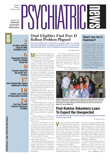In spite of the plethora of antidepressants available to patients, clinicians still have no easy way of determining whether a patient will respond to one better than another.
However, a quick test to identify patients who will not respond to the SSRI antidepressants may have been found. It is called the Controlled Oral Word Association Test FAS (FAS test for short) and reveals impaired verbal fluency.
Various lines of study have suggested that there is a link between psychomotor retardation—that is, sluggish thinking, speaking, moving, and reacting—and reduced functioning of the neurotransmitter dopamine in the brain. Moreover, psychomotor retardation exhibited by a sub-group of depressed patients also has been associated with decreased dopamine function. So Bonnie Taylor, Ph.D., an instructor in psychology at the New York State Psychiatric Institute, and coworkers suspected that depressed patients with lower psychomotor skills might not respond to an SSRI antidepressant because a dopamine deficit causes or contributes to their depression and because an SSRI would not correct their dopamine deficit. They decided to test this hypothesis.
Forty-seven subjects were recruited from an outpatient research clinic at the New York State Psychiatric Institute. All met DSM-IV criteria for major depressive disorder and were between 18 and 65 years old. The researchers gave neuropsychological tests to all of the subjects before they started a 12-week open trial of fluoxetine treatment. The tests concerned not only psychomotor skills, but also attention, executive functioning, verbal intelligence, and visuospatial functioning.
Of the 37 subjects who finished the study, 25 were rated as fluoxetine responders and 12 as nonresponders. The researchers found that the two groups did not perform any differently on the attention, executive functioning, verbal intelligence, and visuospatial functioning tests, but they did perform differently on the psychomotor functioning ones. Specifically, even when baseline depression severity was taken into consideration, the nonresponders performed significantly worse in verbal fluency on the FAS. They also tended to perform worse than the responders on the Stroop Color and Word Test in both color naming and word reading and on the WAIS-III digit symbol subtest.
The investigators also obtained FAS test scores for a healthy group matched to the depressed subjects by age and level of education. They found that all depressed subjects who scored above the norm responded to fluoxetine, compared with 40 percent of subjects who scored below the norm.
Thus, the results, which appeared in the January American Journal of Psychiatry, tended to confirm the researchers' hypothesis—that depressed patients with slow psychomotor skills were not apt to respond to an SSRI antidepressant. Also, the FAS test did a better job than the other psychomotor tests at predicting SSRI response. The FAS test could ultimately prove to be of value to clinical psychiatrists, “but we obviously need to do more work on it,” Patrick McGrath, M.D., an associate professor of clinical psychiatry at Columbia University and one of the study investigators, said in an interview.
“The hope is that if we can get a simple, inexpensive test, which this is, which doesn't require fancy technology, which can be done in the office, and which takes a few minutes, it would help us better estimate people's chances of responding to antidepressant treatment.”
Indeed, the FAS “is a very simple test to administer,” Taylor concurred. “Patients are asked to say as many words as they can think of that start with the letters `F,' `A,' and `S' for one minute each. The psychiatrist writes all of the words down and counts the total number of words produced in three minutes.”
Taylor and her team will now attempt to replicate their findings.
The study was funded by Eli Lilly and Co.
Am J Psychiatry 2006 163 73
